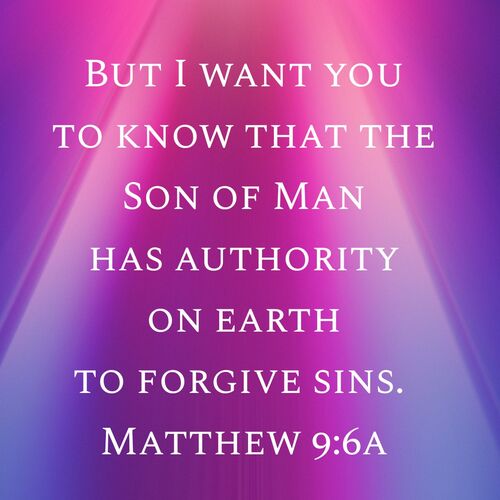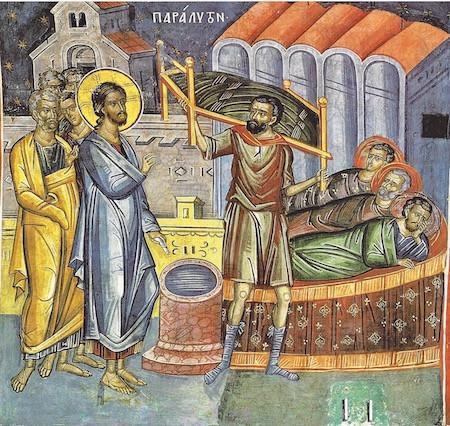Trinity 19

The Nineteenth Sunday after Trinity
In the reading from Isaiah this week, God reminds His people that He has forgiven their sins. He has redeemed them so they can return to Him. In the gospel, we again see God forgiving sins, as Jesus forgives the sin of the paralyzed man who had faith. He asks the teachers of the law
Which is easier: to say, ‘Your sins are forgiven,’ or to say, ‘Get up and walk’?
Perhaps either is pretty easy to say if your words are empty – but which is easier to say truthfully? with authority? And so, by the visible healing of the paralyzed man, Jesus stabs to the heart of their doubts and shows the authority with which He speaks. He does not ask the question simply to humiliate them, but in mercy to give them yet another chance to believe in Him and be saved. Which of Jesus’ gifts to the paralyzed man was the greater?
The Old Testament lesson is from the book of Isaiah, chapter 44, verses 21-23:
Remember these things, O Jacob,
and Israel, for you are my servant;
I formed you; you are my servant;
O Israel, you will not be forgotten by me.
I have blotted out your transgressions like a cloud
and your sins like mist;
return to me, for I have redeemed you.
Sing, O heavens, for the Lord has done it;
shout, O depths of the earth;
break forth into singing, O mountains,
O forest, and every tree in it!
For the Lord has redeemed Jacob,
and will be glorified in Israel.
The Epistle lesson is from Ephesians, chapter 4, verses 22-28:
You were taught, with regard to your former way of life, to put off your old self, which is being corrupted by its deceitful desires; to be made new in the attitude of your minds; and to put on the new self, created to be like God in true righteousness and holiness.
Therefore each of you must put off falsehood and speak truthfully to your neighbor, for we are all members of one body. “In your anger do not sin”: Do not let the sun go down while you are still angry, and do not give the devil a foothold. Anyone who has been stealing must steal no longer, but must work, doing something useful with their own hands, that they may have something to share with those in need.
The Gospel for the Nineteenth Sunday after Trinity is from Matthew, chapter 9, verses 1-8:
Jesus stepped into a boat, crossed over and came to his own town. Some men brought to him a paralyzed man, lying on a mat. When Jesus saw their faith, he said to the man, “Take heart, son; your sins are forgiven.”
At this, some of the teachers of the law said to themselves, “This fellow is blaspheming!”
Knowing their thoughts, Jesus said, “Why do you entertain evil thoughts in your hearts? Which is easier: to say, ‘Your sins are forgiven,’ or to say, ‘Get up and walk’? But I want you to know that the Son of Man has authority on earth to forgive sins.” So he said to the paralyzed man, “Get up, take your mat and go home.” Then the man got up and went home. When the crowd saw this, they were filled with awe; and they praised God, who had given such authority to man.
Which is easier: to say, ‘Your sins are forgiven,’ or to say, ‘Get up and walk’?
Perhaps either is pretty easy to say if your words are empty – but which is easier to say truthfully? with authority? And so, by the visible healing of the paralyzed man, Jesus stabs to the heart of their doubts and shows the authority with which He speaks. He does not ask the question simply to humiliate them, but in mercy to give them yet another chance to believe in Him and be saved. Which of Jesus’ gifts to the paralyzed man was the greater?
The Old Testament lesson is from the book of Isaiah, chapter 44, verses 21-23:
Remember these things, O Jacob,
and Israel, for you are my servant;
I formed you; you are my servant;
O Israel, you will not be forgotten by me.
I have blotted out your transgressions like a cloud
and your sins like mist;
return to me, for I have redeemed you.
Sing, O heavens, for the Lord has done it;
shout, O depths of the earth;
break forth into singing, O mountains,
O forest, and every tree in it!
For the Lord has redeemed Jacob,
and will be glorified in Israel.
The Epistle lesson is from Ephesians, chapter 4, verses 22-28:
You were taught, with regard to your former way of life, to put off your old self, which is being corrupted by its deceitful desires; to be made new in the attitude of your minds; and to put on the new self, created to be like God in true righteousness and holiness.
Therefore each of you must put off falsehood and speak truthfully to your neighbor, for we are all members of one body. “In your anger do not sin”: Do not let the sun go down while you are still angry, and do not give the devil a foothold. Anyone who has been stealing must steal no longer, but must work, doing something useful with their own hands, that they may have something to share with those in need.
The Gospel for the Nineteenth Sunday after Trinity is from Matthew, chapter 9, verses 1-8:
Jesus stepped into a boat, crossed over and came to his own town. Some men brought to him a paralyzed man, lying on a mat. When Jesus saw their faith, he said to the man, “Take heart, son; your sins are forgiven.”
At this, some of the teachers of the law said to themselves, “This fellow is blaspheming!”
Knowing their thoughts, Jesus said, “Why do you entertain evil thoughts in your hearts? Which is easier: to say, ‘Your sins are forgiven,’ or to say, ‘Get up and walk’? But I want you to know that the Son of Man has authority on earth to forgive sins.” So he said to the paralyzed man, “Get up, take your mat and go home.” Then the man got up and went home. When the crowd saw this, they were filled with awe; and they praised God, who had given such authority to man.

Jesus Heals the Paralytic [Public domain]
Recent
Archive
2023
April
Categories
no categories
